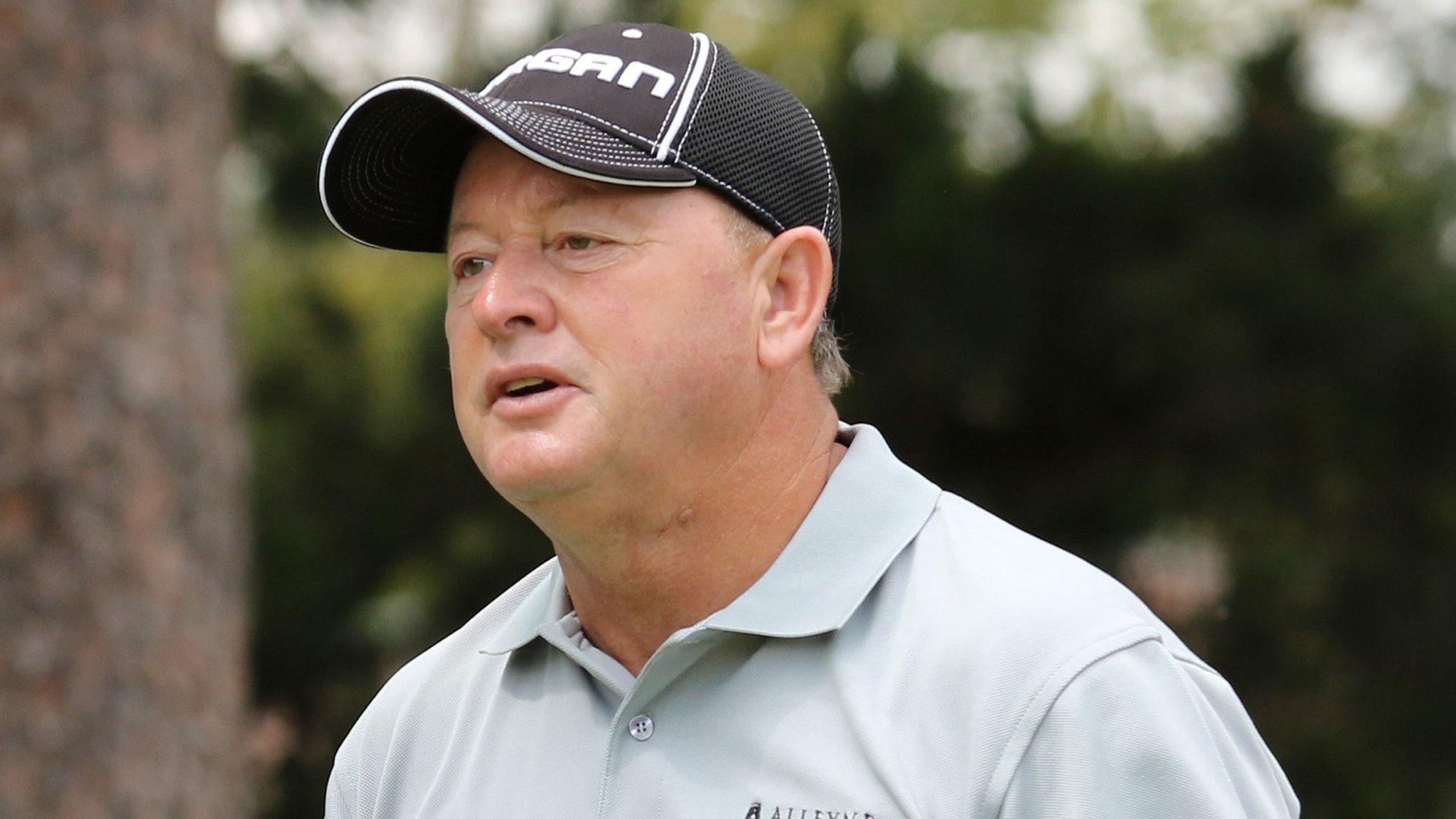PGA Tour's new CJ Cup lays down challenge to European Tour
- Published
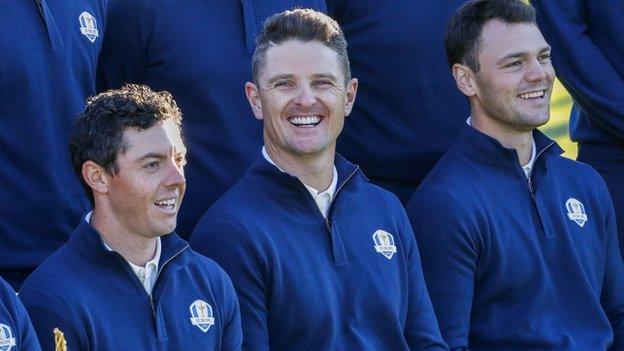
Rory McIlroy and Justin Rose are two British players who will need to play in more PGA Tour tournaments
American golf has been celebrating a thumping Ryder Cup triumph and now in one of the sport's key marketplaces it can claim another significant victory over Europe.
As both the PGA and European Tours seek to grow their brands, the relatively untapped but fertile Asian market provides the biggest opportunity for expansion.
This is the sport's biggest battleground and the US has announced a big move with an eye-wateringly lucrative deal in South Korea.
Furthermore, a subtle rule change on PGA Tour membership conditions will make life more difficult for the likes of Rory McIlroy and Justin Rose, UK golfers who play their home circuit as well as in the United States.
It is the announcement of the new CJ Cup in South Korea that will grab most attention. The event will be played next October and forms part of a three tournament PGA Tour swing in Asia.
They already have the CIMB Classic, won last Sunday by Justin Thomas, in Malaysia and a share of the HSBC WGC Champions tournament in Shanghai. As a World Golf Championships event this is jointly run with their European counterparts, who are the lead Tour for its administration.
And the addition of the new South Korean tournament firmly establishes the PGA Tour in a part of the world that was previously a European Tour stronghold. The CJ Cup will be limited to 78 players, who will compete for a massive $9.25 million (£7.55m) prize fund.
Only the majors, The Players Championship and the four WGC's boast bigger purses.
The European Tour's Volvo China Open is worth £2.4 million, while the Abu Dhabi Championship - which pays significant appearance fees - is the most lucrative in the Middle East at £2.7 million.
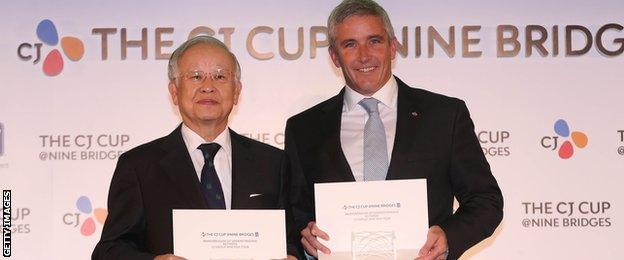
The new deal, overseen by Jay Monahan (right) will see the first CJ Cup take place from 16 October 2017
It is also significant that the new Korean event was announced by the PGA Tour's Jay Monahan, the man who will soon succeed Tim Finchem as the Commissioner of the Florida-based organisation.
"This tournament will be on the Korean sports landscape for years to come," Monahan claimed.
"We have a tremendous population of Korean golfers on the PGA Tour, and we anticipate that will continue as The CJ Cup inspires a new generation of players, not only in Korea, but also around the world."
Keith Pelley, the man in charge of the European Tour, will seize on the sums involved in the Korean deal in his bid to drive through new contracts to make his circuit more lucrative.
If nothing else, the new tournament shows the high price that top-class golf can command. But one of Pelley's challenges is to avoid losing ground in that key Asian market while finding more sponsors to back events closer to home.
Under the charismatic Canadian's tenure as chief executive it has, so far, only worked in conjunction with Italy's successful bid to stage the 2022 Ryder Cup. As a result, the Italian Open will annually be worth 7 million euros (£6.2 million) for 11 years from 2017.
It is one thing to land such a deal with the Ryder Cup involved and quite another where there is not that juicy incentive for potential backers.
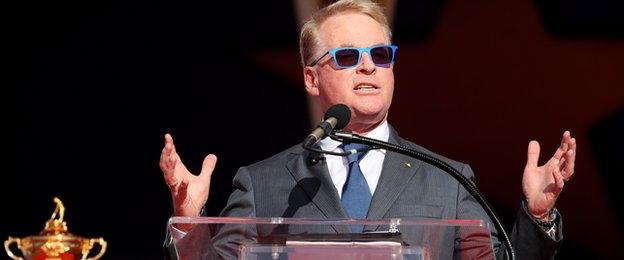
Keith Pelley took over as chief executive of the European Tour in the summer of 2015
Then you are reliant on attracting enough big names to create stellar fields. And from Europe's point of view that has not been made any easier by a rule change to PGA Tour membership.
Players who do not compete in 25 events in a season will now have to add to their following year's schedule a tournament that they have not played in the last four years. Failure to do so would lead to a heavy fine or possible suspension.
The idea is to bolster the PGA Tour events that do not naturally attract the biggest names, but it intrinsically means several golfers, many of them European, will have to commit to events they do not really wish to play.
McIlroy, the winner of the Tour's season long FedEx Cup, played only eighteen PGA events last year as he juggled his schedule to fit the demands of the European circuit.
There he is required to play at least five times, although the French Open counted as two events this year. There's no doubt this new PGA Tour rule most inconveniences the America-based Europeans keeping a foot in both schedules.
"If this is your only tour, it's a fair rule," observed Paul Casey, who has turned his back on the European Tour to concentrate on America. "If you're playing two tours, then it's tough."
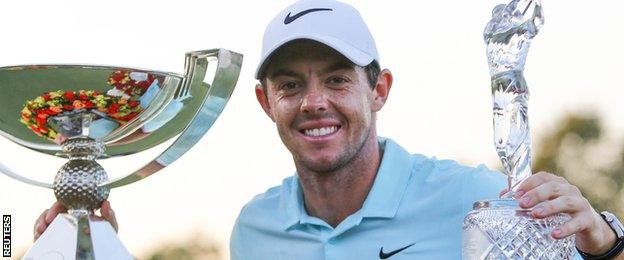
McIlroy finished in the top 10 of all four of the European Tour events he played last season but won the PGA Tour's FedExCup play-offs to win $10m in bonus prize money
One extra US tournament does not seem much to ask, but it could negatively impact on Pelley's chances of persuading the big names to play more on his circuit.
Which is a shame because the European Tour has so much to offer, not only through its ever-more modern approach but through the appeal of its established names.
Padraig Harrington's stirring victory at last Sunday's Portuguese Masters was a perfect example as the 45-year-old three-times-major champion held off defending champion Andy Sullivan.
Further down Oli Fisher kept his nerve for the top-10 finish that enabled him to keep his Tour card, while there was heartbreak for Graeme Storm, Craig Lee and Eddie Pepperell as they just missed out on retaining playing privileges.
It really is a cut-throat business, both on and off the course.
- Published11 October 2016
- Published3 October 2016
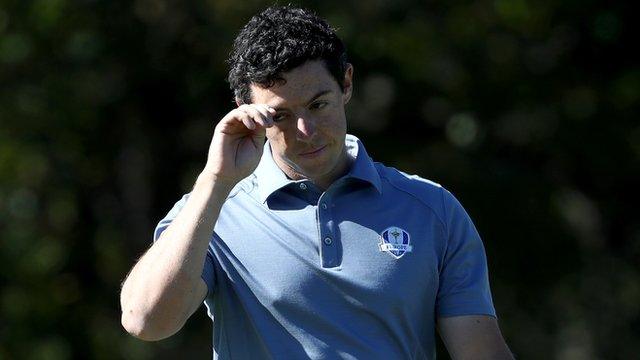
- Published19 October 2016
